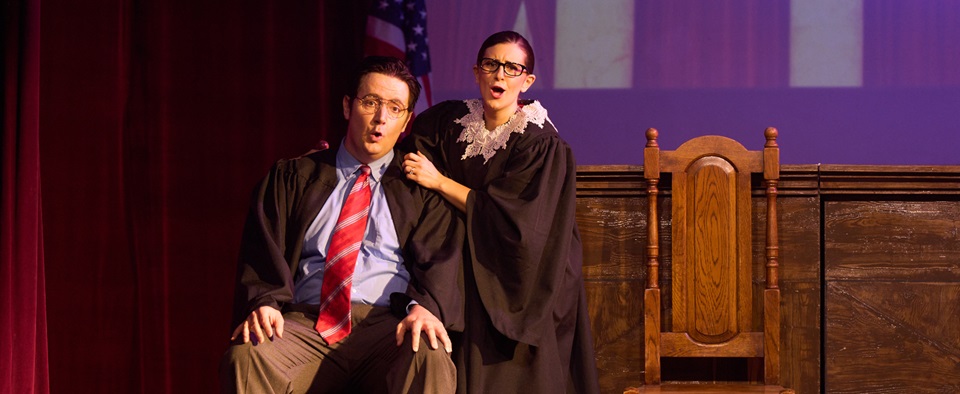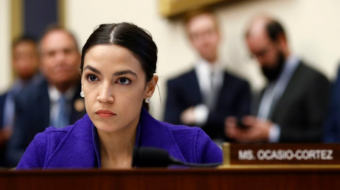
LOS ANGELES — In Highland Park, north of Downtown L.A., the hottest ticket is a seat at the trial of Supreme Court justices Antonin Scalia (tenor William Grundler) and Ruth Bader Ginsburg (soprano Rachel Policar). They appear before the Commentator (bass Paul Chwe Minchul An), a berobed sort of St. Peter figure who surveys their record and assesses their eligibility for a peaceful reward in the afterlife.
Such is the conceit of Derrick Wang’s hour-long comic opera Scalia/Ginsburg, the opening number on a double bill offered by Pacific Opera Project that also includes the one-act Trial by Jury by W.S. Gilbert and Arthur Sullivan.
The warm friendship between these two icons of the Supreme Court, Scalia on its far right, “originalist” wing, and Ginsburg on its most expansive left wing has often struck Americans who follow the Supreme Court as quite an anomalous phenomenon. How could they be so chummy?
Well, the answer is not hard to discern, and it could be a lesson for the rest of us. Despite their highly divergent ideas about society and the law, they were both ardent opera lovers, and they made a mutually satisfying decision to base their close association on that passion in order to get along.

The current production by POP (seen Nov. 17) is the Los Angeles premiere of a work that has already taken audiences by storm around the country and even abroad. It owns the distinction of having been first introduced at the U.S. Supreme Court itself in 2013, a premiere RBG pronounced “a dream come true.” OperaWire dubbed it “the kind of opera that should be everywhere.” Scalia/Ginsburg was staged in 2015 at the Castleton Festival and revised for the Glimmerglass Festival in 2017 and continues to be produced by companies throughout the U.S. Its Australian premiere, by Orchestra Victoria, took place in 2021, attesting to the viability of continuing, respectful, serious dialogue, even if many of the court cases and decisions referred to would be unfamiliar to foreign audiences.
One critic, writing in the Los Angeles Times, pleaded, “Could we please make it a constitutional requirement that no one can be sworn into office in the White House or Congress without having first seen Scalia/Ginsburg?” Hear, hear!
To the delight of the company and the audience, composer Derrick Wang was in attendance for the L.A. premiere. He is also a practicing attorney, teaching law and music courses at The Peabody Conservatory of The Johns Hopkins University.
The initial premise is that Antonin Scalia is about to face his maker. His examiner, the Commentator, is modeled after a well-known character in opera, the Commendatore, a basso profundo, the father of a woman Mozart’s Don Giovanni has violated, who himself dies at Don Giovanni’s sword as he attempts to defend his daughter’s honor. In the end, the statue of the Commander comes to life, demands penance from the playboy, and when Don Juan refuses, condemns him to hell and eternal damnation.
The Commentator has sealed the courtroom so that no man may enter or leave—but Ginsburg shows up to support her friend, saying the Commentator did not include women in his ban! “Not the first time I’ve had to break through a ceiling,” she reminds him.
Audience members who are versed in the law will be thrilled to have such cases as Bush v. Gore (2000), Craig v. Boren (1976), Moritz v. Commissioner of Internal Revenue (1972), Frontiero v. Secretary of Defense (1973), Roe v. Wade (1972), and Shelby County v. Holder (2013) all receive operatic treatment as their arguments are rehashed. In many cases, Scalia, wedded to his “originalist” Constitutional dogma which barely acknowledges the evolution of American society since the late 18th century, became famous for his iconoclastic dissents. As indeed, in many key cases where the progressive side lost in 5-4 votes, Ginsburg herself also issued her ringing dissents.
Other audiences who come to the opera with some background in the vocal arts, will instantly pick up on Wang’s use of popular songs (the first I noticed was “The First Noël”) and melodies from such operas as The Magic Flute, La Bohème, La Traviata, Carmen, Tosca, and others. He exploits the human voice in coloratura rage arias and baroque Handelian decoration, as well as sultry jazz, all in great fun. Meanwhile, the video installation illustrates the sung text—although curiously, every time the Constitution is mentioned, it’s not an image of that document that appears on screen but the “We the People” Declaration of Independence.
The feisty friends must face three trials, a defense of their legal philosophy, an order of silence (hard for these two to adhere to that one!), and a commitment to serve justice together, despite their differences, with the understanding that though they disagree, it is the Court’s design to resolve the contradictions and tensions that evolve over time.
It’s not hard to understand why Scalia/Ginsburg has been received so enthusiastically. It takes sober legal debates very much to heart with a winsome wink. A small seven-piece orchestra led by Caleb Yanez Glickman seemed enough for the funky, let’s-put-on-an-opera spirit of this adventurous company.
“From where I sit / They’re full of…”

After intermission, the program continued with the Gilbert & Sullivan gem, Trial by Jury. As he often does with these standard works that need a fresh dusting off, Artistic Director Josh Shaw’s new libretto updates the setting from 1880s England to a 1980s L.A. divorce court. The three singers in S/G return in new roles: Rachel Policar takes on the suffering wife Angelina, William Grundler plays the Judge, and Paul Chwe Minchul An serves as the Usher (the Bailiff in G&S’s story). What brave, versatile performers! In addition, we have Todd Strange as the straying husband Edwin, David Herrington as the Foreman of the jury, and Christine Li as “The Council,” by which I assume is meant Angelina’s counsel—a woman in that role, at which Messrs. G&S would surely have raised an eyebrow.
Gilbert and Sullivan made their careers in a dozen or so operettas all taking on some social custom or institution (the military, the arts, Parliament, royalty, etc.) and subjecting them, and often identifiable individuals as well, to satire that, while sharp, was also loving of all things British. They displayed a keen understanding of social class and privilege (much of it unearned), though in the place of class war, they embraced compromise, love, and a generalized leveling of rank.
Trial by Jury takes on the courts, with its pomp, pretensions, and presumptions. The Usher instructs the jury that this will be a fair, unbiased trial, involving an innocent bride and a vile cad. The Judge recounts (in one of G&S’s standard patter songs) how he came to his position—initially by marrying “a rich attorney’s elderly, ugly daughter.”
The husband in this case has strayed from his marriage vows. An interesting discussion ensues as to natural changes of affection, which may owe something to the entrenched conversation roiling the world of science in the 19th century with the Darwinian theory of evolution. But both sides, it appears, have strayed—and there are photos. From the bench, the Judge sings, “From where I sit / They’re full of…it.”
The double bill continues for one more weekend at the Highland Park Ebell Club, 131 S. Ave, 57, Los Angeles 90042, with performances Fri., Nov. 24, Sat., Nov. 25 at 7:00 p.m., and Sun., Nov. 26 at 3:00 p.m. Ticket information is available here.
We hope you appreciated this article. At People’s World, we believe news and information should be free and accessible to all, but we need your help. Our journalism is free of corporate influence and paywalls because we are totally reader-supported. Only you, our readers and supporters, make this possible. If you enjoy reading People’s World and the stories we bring you, please support our work by donating or becoming a monthly sustainer today. Thank you!












Comments